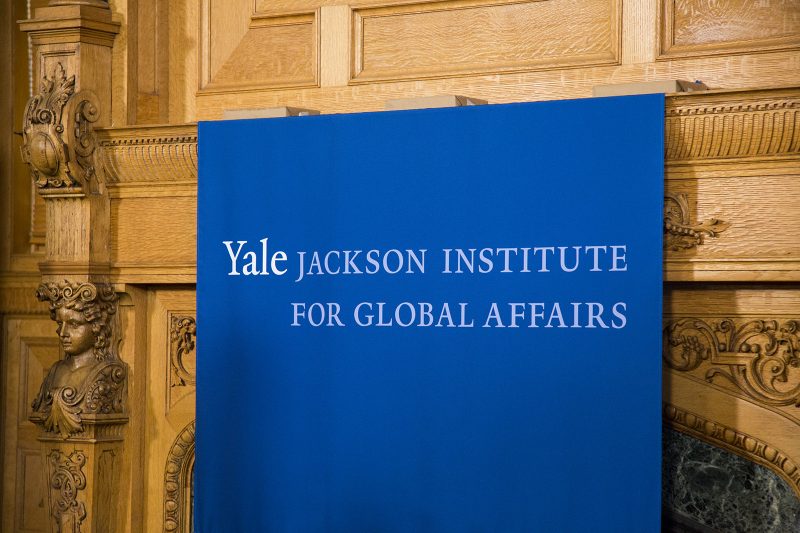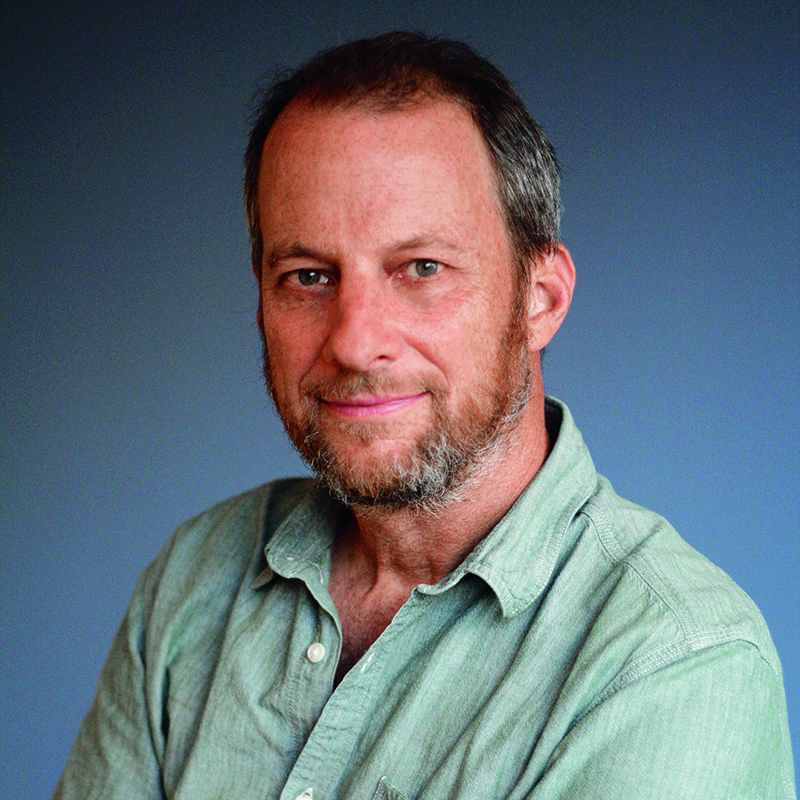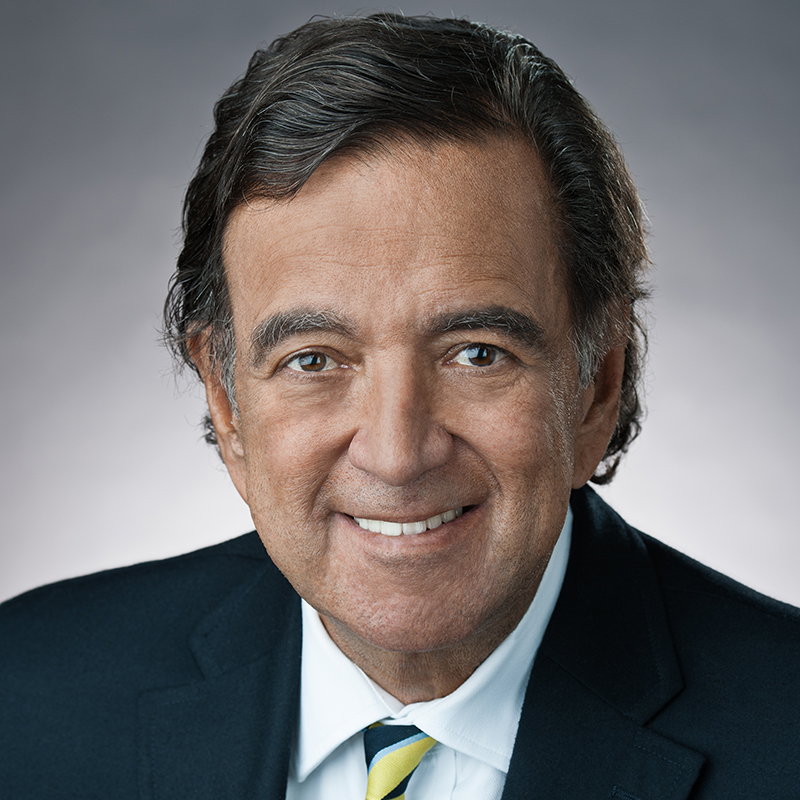The Jackson Institute for Global Affairs is pleased to announce the 2018-2019 Senior Fellows.
Jackson Senior Fellows are leading practitioners in various fields of international affairs who spend a year or semester at Yale teaching courses and mentoring students. This year’s group includes eight newcomers and 12 returning Fellows.
Learn more about the Senior Fellows.
Susan Biniaz
Susan Biniaz, a former Deputy Legal Adviser at the U.S. State Department, was the lead climate lawyer and a climate negotiator from 1989 to early 2017. She worked on a wide variety of other subjects during her time at the State Department, including legal issues related to U.S. treaty practice, outer space, law of the sea, the environment, Somali piracy, the Middle East, Europe, the Western Hemisphere, law enforcement, human rights, and private international law. Since leaving the government, she has taught international law courses at Columbia, the University of Chicago, and Yale. She is currently a Senior Fellow at the UN Foundation, an Associate Researcher at the French think tank IDDRI, and a Senior Advisor at the Center for Climate and Energy Solutions. Sue attended Yale College and Columbia Law School and clerked for Judge Dorothy Nelson on the 9th Circuit Court of Appeals.
Ryan Crocker
Ryan Crocker is currently a Diplomat in Residence at Princeton University. He is on a leave of absence from Texas A&M University as an Executive Professor. From 2010-2011 and 2013-2016, he served as Dean of the George Bush School of Government & Public Service at Texas A&M.
He retired from the Foreign Service in April 2009 after a career of over 37 years but was recalled to active duty by President Obama to serve as U.S. Ambassador to Afghanistan in 2011. He has served as U.S. Ambassador six times: Afghanistan (2011-2012), Iraq (2007-2009), Pakistan (2004-2007), Syria (1998-2001), Kuwait (1994-1997), and Lebanon (1990-1993).
Born in Spokane, Washington, he grew up in an Air Force family, attending schools in Morocco, Canada and Turkey, as well as the U.S. He received a B.A. in English in 1971 and an honorary Doctor of Laws degree in 2001 from Whitman College (Washington). He is a member of the Council on Foreign Relations, the American Academy of Diplomacy, and the Association of American Ambassadors. In August 2013, he was confirmed by the United States Senate to serve on the Broadcasting Board of Governors which oversees all U.S. government-supported civilian international media.
He retired from the Foreign Service in April 2009 after a career of over 37 years but was recalled to active duty by President Obama to serve as U.S. Ambassador to Afghanistan in 2011. He has served as U.S. Ambassador six times: Afghanistan (2011-2012), Iraq (2007-2009), Pakistan (2004-2007), Syria (1998-2001), Kuwait (1994-1997), and Lebanon (1990-1993).
Born in Spokane, Washington, he grew up in an Air Force family, attending schools in Morocco, Canada and Turkey, as well as the U.S. He received a B.A. in English in 1971 and an honorary Doctor of Laws degree in 2001 from Whitman College (Washington). He is a member of the Council on Foreign Relations, the American Academy of Diplomacy, and the Association of American Ambassadors. In August 2013, he was confirmed by the United States Senate to serve on the Broadcasting Board of Governors which oversees all U.S. government-supported civilian international media.
Janine di Giovanni
Janine di Giovanni is the former an Edward R. Murrow Press Fellow at the Council on Foreign Relations (CFR) and last spring was Professor of Practice in Human Rights at Columbia University’s School of International and Public Affairs (SIPA). She is most recently the author of three-time award-winning book, The Morning They Came For Us: Dispatches from Syria, which has been translated into 30 languages. She is also the author of seven other books on war and conflict.
Before joining CFR as a fellow in 2017, Di Giovanni was the Middle East Editor at Newsweek reporting mainly on human rights abuses and investigating war crimes, and an award-winning writer for the New York Times, Vanity Fair, Harpers, Granta, The New York Review of Books and the Guardian. A recent Pakis Scholar at Tufts University’s Fletcher School of Law and Diplomacy, Di Giovanni has extensive experience focusing on war crimes, international law and international security.
She is a leading expert analyst on the Middle East, Balkans and Africa, geopolitical risk, international security, conflict prevention, strategic communications, human rights, sustainability, and global terrorism. She has investigated war crimes and reported war on four continents over the past three decades.
Di Giovanni has reported widely on war, conflict, and its aftermath for more than 30 years in the Middle East, the Balkans, and Africa. She has witnessed the siege of Sarajevo, the fall of Grozny, and the genocide of Srebrenica and Rwanda as well as more than a dozen active conflicts where she was a front-line witness. She has won more than 10 major awards for her war reporting.
Before joining CFR as a fellow in 2017, Di Giovanni was the Middle East Editor at Newsweek reporting mainly on human rights abuses and investigating war crimes, and an award-winning writer for the New York Times, Vanity Fair, Harpers, Granta, The New York Review of Books and the Guardian. A recent Pakis Scholar at Tufts University’s Fletcher School of Law and Diplomacy, Di Giovanni has extensive experience focusing on war crimes, international law and international security.
She is a leading expert analyst on the Middle East, Balkans and Africa, geopolitical risk, international security, conflict prevention, strategic communications, human rights, sustainability, and global terrorism. She has investigated war crimes and reported war on four continents over the past three decades.
Di Giovanni has reported widely on war, conflict, and its aftermath for more than 30 years in the Middle East, the Balkans, and Africa. She has witnessed the siege of Sarajevo, the fall of Grozny, and the genocide of Srebrenica and Rwanda as well as more than a dozen active conflicts where she was a front-line witness. She has won more than 10 major awards for her war reporting.
George Packer
George Packer is a staff writer for The New Yorker. His most recent book, “The Unwinding: An Inner History of the New America,” won the 2013 National Book Award for non-fiction. “The Assassins’ Gate: America in Iraq” was named one of the 10 best books of 2005 by the New York Times and won the New York Public Library’s Helen Bernstein Book Award and the Overseas Press Club book award. He is the author of three other works of non-fiction, two novels, and a play. Packer has received fellowships from the Guggenheim Foundation, the American Academy in Berlin, the Cullman Center for Scholars and Writers at the New York Public Library, the New America Foundation, and the Whiting Foundation. His new book, "Our Man: Richard Holbrooke and the End of the American Century," will be published in May 2019.
David Rank
Dave Rank spent 27 years as a State Department Foreign Service Officer, including his final assignment as Deputy Chief of Mission and, following the 2016 election, as the Charge’ d’Affaires (acting Ambassador) at the U.S. Embassy in Beijing. In addition to six Foreign Service assignments in greater China (three in Beijing, two at the American Institute in Taiwan and one at the U.S. Consulate General in Shanghai), Rank served at the U.S. embassies in Kabul, Athens, and Port Louis (Mauritius). In Washington, he worked in the office of the Special Representative for Afghanistan and Pakistan (SRAP), the State Department Korea desk, as Special Assistant to the Under Secretary of State for Political Affairs and as a Fellow at Georgetown University’s Institute for the Study of Diplomacy.
He now serves as the head of the China practice at The Cohen Group, a global business strategy consultancy. Dave also teaches at the Johns Hopkins University School for Advanced International Studies (SAIS) and is Senior Fellow at the Energy Policy Institute of the University of Chicago (EPIC) and at the U.S. Institute of Peace. He speaks Mandarin Chinese, French, Dari and Greek.
He now serves as the head of the China practice at The Cohen Group, a global business strategy consultancy. Dave also teaches at the Johns Hopkins University School for Advanced International Studies (SAIS) and is Senior Fellow at the Energy Policy Institute of the University of Chicago (EPIC) and at the U.S. Institute of Peace. He speaks Mandarin Chinese, French, Dari and Greek.
Gov. Bill Richardson
During his professional career, Governor Bill Richardson has held leadership positions in the private, government and not-for-profit sectors. From 2010 to the present, Governor Richardson has operated the Richardson Center for Global Engagement, a foundation focusing on conflict resolution, prisoner release and environmental protection. He has more than 30 years of government experience. His latest government position was serving as a two-time Governor of New Mexico (2003-2010). In 2008, Governor Richardson sought the Democratic nomination for president and ran in several presidential primaries.
Prior to his entry into the private sector, Governor Richardson represented New Mexico in the 3rd Congressional District in the U.S. Congress for 15 years (1982-1996). He then was appointed by President Clinton to serve as the U.S. Ambassador to the United Nations and Secretary of Energy (1997- 2000). As a diplomat and Special Envoy to the Organization of American States (OAS) from 2010-2016, he successfully won the release of hostages and American servicemen in North Korea, Cuba, Iraq and the Sudan. He has been nominated for the Nobel Peace Prize four times.
Prior to his entry into the private sector, Governor Richardson represented New Mexico in the 3rd Congressional District in the U.S. Congress for 15 years (1982-1996). He then was appointed by President Clinton to serve as the U.S. Ambassador to the United Nations and Secretary of Energy (1997- 2000). As a diplomat and Special Envoy to the Organization of American States (OAS) from 2010-2016, he successfully won the release of hostages and American servicemen in North Korea, Cuba, Iraq and the Sudan. He has been nominated for the Nobel Peace Prize four times.
Harry K. Thomas, Jr.
Ambassador Harry K. Thomas Jr. is the QBS Learning Board Chairperson. He served as ambassador to Zimbabwe (2016-2018), the Philippines (2010-2013) and Bangladesh (2003-2005). He retired in March 2018 with the rank of Career Minister after more than three decades in the Foreign Service. Ambassador Thomas also served as Executive Secretary and Special Assistant to Secretary Rice, Director General of the Foreign Service, Director for South Asia at the National Security Council and Director of the Operations Center.
Ambassador Thomas speaks Spanish, Hindi, and Bangla. He is a graduate of the College of the Holy Cross and holds a master’s degree from Columbia University. He is a member of the Holy Cross Board of Trustees.
Ambassador Thomas speaks Spanish, Hindi, and Bangla. He is a graduate of the College of the Holy Cross and holds a master’s degree from Columbia University. He is a member of the Holy Cross Board of Trustees.
Margaret Warner
Margaret Warner just stepped down from her post as Chief Global Affairs Correspondent for the PBS NewsHour, public television’s flagship nightly news and analysis program. In 2006, after a dozen years as a substitute anchor, moderator and field reporter on domestic and international issues, she founded the NewsHour’s Overseas Reporting Unit.
For a decade, she produced in-depth reports from regions in crisis, including Israel, the West Bank and Gaza; Pakistan; China; Afghanistan; Russia; Yemen; Iraq; Korea; Egypt; Syria; Turkey, Lebanon and Jordan; Crimea and Ukraine; and Iraqi Kurdistan. While in Washington, she covered the making of U.S. foreign policy.
Warner won an Emmy Award for her 2007 reporting from Pakistan. Other honors include the Edward Weintal Prize for International Reporting from Georgetown University, and the George Polk Award to a Newsweek team for its coverage of terrorism.
She joined the NewsHour in 1993 after two decades as a political, White House and diplomatic correspondent at Newsweek magazine. A panelist in the last 1998 presidential campaign debate, she covered U.S. policymaking during the George H.W. Bush Administration, including the fall of the Berlin Wall, the first Gulf War and the collapse of the Soviet Union. Previously, she reported for the Wall Street Journal, and the Concord (N.H.) Monitor.
For a decade, she produced in-depth reports from regions in crisis, including Israel, the West Bank and Gaza; Pakistan; China; Afghanistan; Russia; Yemen; Iraq; Korea; Egypt; Syria; Turkey, Lebanon and Jordan; Crimea and Ukraine; and Iraqi Kurdistan. While in Washington, she covered the making of U.S. foreign policy.
Warner won an Emmy Award for her 2007 reporting from Pakistan. Other honors include the Edward Weintal Prize for International Reporting from Georgetown University, and the George Polk Award to a Newsweek team for its coverage of terrorism.
She joined the NewsHour in 1993 after two decades as a political, White House and diplomatic correspondent at Newsweek magazine. A panelist in the last 1998 presidential campaign debate, she covered U.S. policymaking during the George H.W. Bush Administration, including the fall of the Berlin Wall, the first Gulf War and the collapse of the Soviet Union. Previously, she reported for the Wall Street Journal, and the Concord (N.H.) Monitor.








